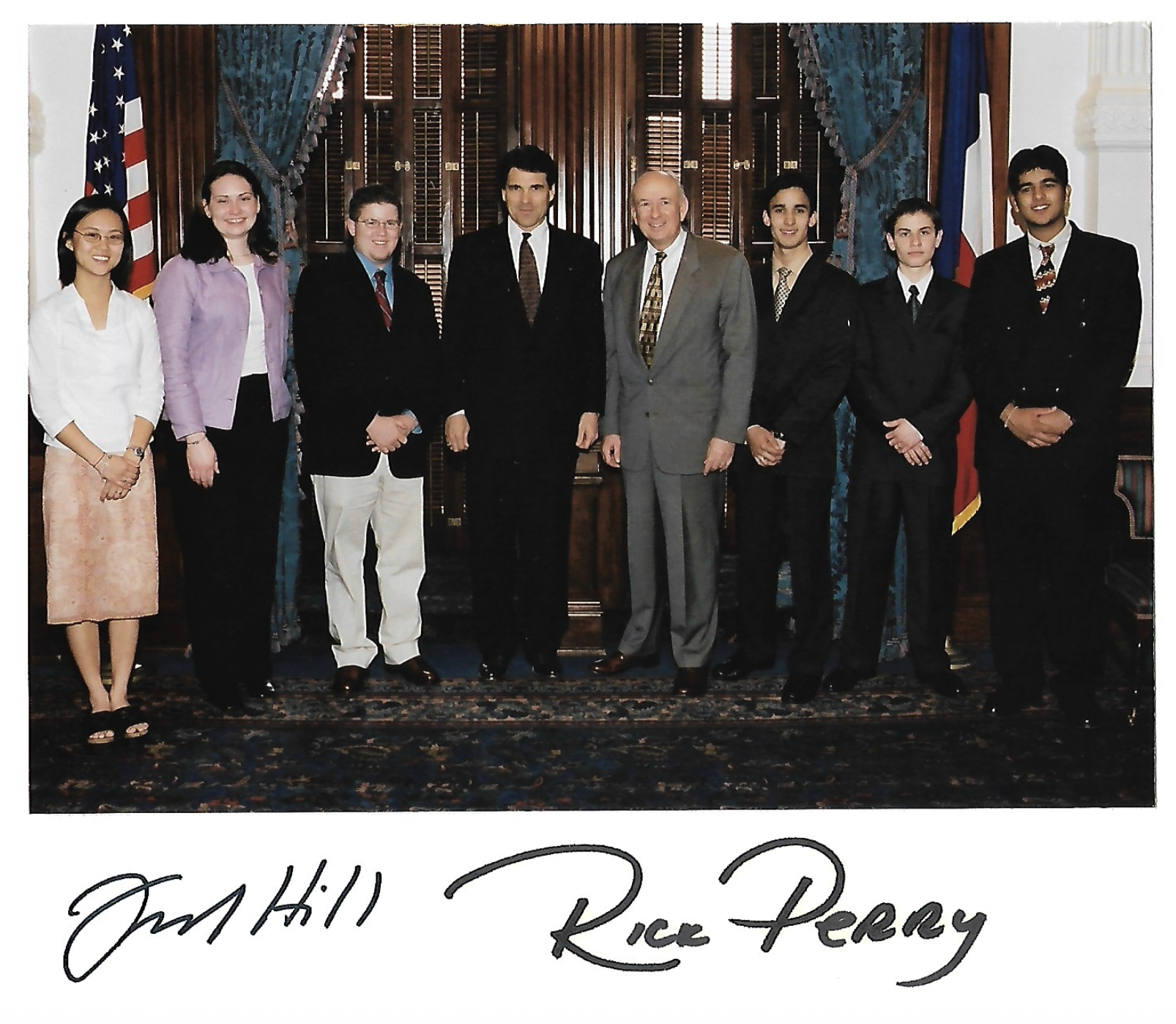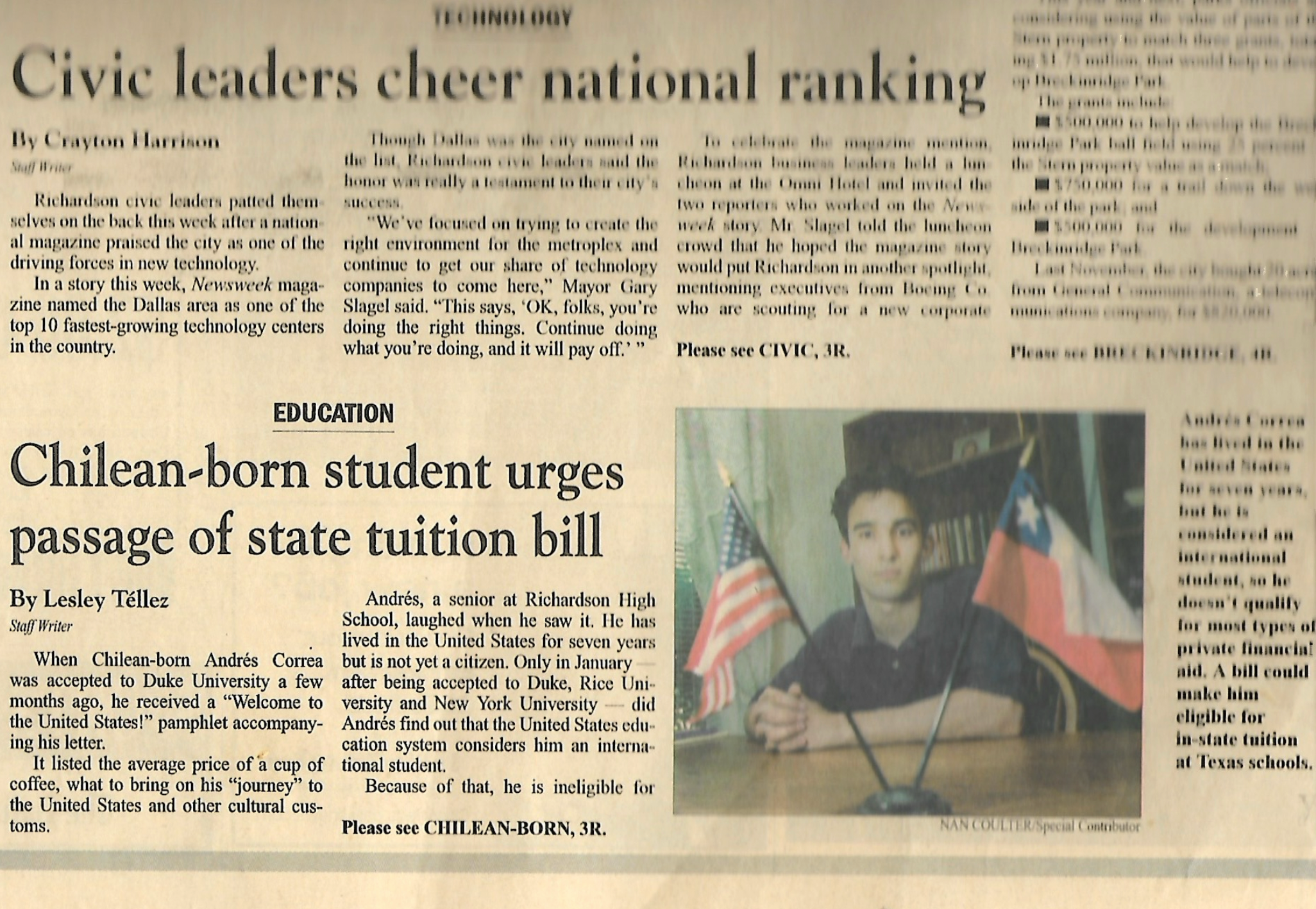At age 18, Andrés Correa helped persuade Gov. Rick Perry to sign the Texas Dream Act, a 2001 state law that allowed students like himself who had been living in Texas but didn’t have U.S. citizenship to qualify for in-state tuition rates at public universities.

Now, as a partner at Dallas-based Lynn Pinker Hurst & Schwegmann, Correa is fighting on a pro bono basis to preserve the law.
Correa is part of a team of lawyers representing a Dallas-area university student, Austin Community College and a Rio Grande Valley advocacy group in an emergency motion to intervene in a federal lawsuit declaring the Dream Act unconstitutional, which was open and shut in one day.
The federal government filed its suit on June 4 — two days after the Texas legislative session closed, the motion notes — and within hours, Texas responded by filing a joint motion asking the court to side with the feds, which U.S. District Judge Reed O’Connor did.
Since then, the Texas Higher Education Coordinating Board has sent a letter to college presidents instructing them to adjust tuition for undocumented students attending school this fall who had benefitted from the Dream Act.
Correa and his team argue in the emergency motion, filed late Tuesday, that Texas entered into a collusive agreement with the federal government and that the case should be re-opened because his clients will suffer significant harm absent adequate representation in the litigation.
“I remember saying back in 2001 to a reporter that investing in us will help the country,” Correa said. “Twenty-five years later, I’ve represented some of the largest pipeline and refinery companies in the world, served in leadership positions at multiple nonprofits, created scholarships, and most importantly, coached little league. Isn’t that what Texas wants to incentivize?”
Citizen Lobbyist
Correa was born in Santiago, Chile, to a pair of English language teachers in 1983. When he was in the sixth grade, his parents accepted jobs in Louisiana as Spanish teachers in public schools. Two years later, when Correa was in the eighth grade, the family moved to Texas, where his parents continued to teach in Dallas schools. The family held visas that allowed them to be in the U.S. and began a lengthy application process for U.S. citizenship.
Correa attended Richardson High School, where he played ice hockey, competed in wrestling and performed in theater. He got good grades and was accepted at a number of prestigious colleges, including Duke University, New York University and Rice University.
But he quickly learned that with only a visa, the education system considered him an international student, and therefore, he did not qualify for in-state tuition at Texas public universities. Nor was he eligible for federal financial aid and most types of private financial aid.
About the same time Correa’s family was grappling with how they would afford his college education, his government teacher encouraged him to participate in a school trip to the state capitol in Austin. As Correa prepared for the trip, his parents learned that a bill was being debated that would allow students in a similar situation to him to qualify for in-state tuition.
Correa researched the bill — “This was before Google; I don’t even know how I learned more about it,” he said — and discovered that House Bill 1403, co-authored by Richardson Representative Fred Hill, a Republican, was indeed being considered.
Correa wrote a one-page paper explaining his situation and arguing that the bill would have a positive impact. He made multiple copies of the paper and took them with him to Austin. During a program for the students, Correa slipped out, determined to take his paper to lawmakers.
“I started going office-to-office, just knocking on doors, leaving my little write-up, saying, ‘Hey, this is important. This matters. This is me,’” Correa said.
Correa spoke with Hill, who was one of the trip’s sponsors. Hill was gracious and spoke with Correa “at length,” he said.

As part of the trip itinerary, Correa and his fellow students posed for a photo with the governor. Perry shook the students’ hands, and when the governor extended his hand to Correa, the student handed him his paper.
Perry read the letter on the spot. After he finished, he conferred with a colleague in the room who said they were working on the bill. Perry wanted to know one thing: If the bill passed, would Correa stay in Texas?
Correa replied that he would, even though he really wanted to go to Duke. Perry pledged to “take care of” the bill, Correa remembers. The bill went on to pass with bipartisan support and went into effect the following fall. Later, about 20 states would pass similar legislation, according to the Texas State Historical Association.
When Correa returned to Dallas, a local newspaper and TV station wanted to interview him. Correa told the Richardson Morning News that he had been called a “citizen lobbyist” in Austin.
“It was kind of an ironic play on words there,” he told the newspaper.

The University of Texas at Dallas reached out to him about an open spot in a scholarship program. Correa benefited from the Dream Act and his in-state tuition was covered by the UT Dallas scholarship. He graduated from UT Dallas in 2005 with a bachelor’s degree in government and politics. He obtained permanent resident status in time for law school, which allowed him to get financial aid. He attended NYU School of Law and returned to Dallas in 2010 as an associate at the boutique law firm where he is now partner. That same year, he gained U.S. citizenship at age 27.
True to his word that he’d given the governor, Correa has stayed in Texas. He has tried multimillion-dollar cases and won over $150 million in verdicts. His client list includes headline-grabbing companies, including pipeline giant Energy Transfer and gas station owner Sunoco.
“The whole thing changed my life,” Correa said.
Compelled to Do Something
Correa was on his way to have dinner with a childhood friend when he saw a news report June 4 about the federal lawsuit against Texas over the Dream Act. He was saddened but tucked away his phone to celebrate his friend’s new job as a high school principal.
After dinner, Correa re-visited the news and discovered an update: Texas had agreed that federal law preempts the Dream Act and that the Texas law was unconstitutional. The parties asked Judge O’Connor to issue a permanent injunction prohibiting the state “as well as its successors, agents, and employees” from applying the Dream Act. The judge had signed an order and final judgment.
“When I see at 6 p.m. there’s been a lawsuit attacking [the Dream Act], it makes me sad,” Correa said. “But as a lawyer, I’m thinking, ‘OK, I’d like to learn more about it. I’d like to look into it, see if they’re right, see if there’s constitutionality issues, preemption issues.’ But then when I see by 8 p.m. that it’s over, I don’t understand. So that compelled me to do something.”
Correa reached out to friends and colleagues. Chris Schwegmann, a name partner at Lynn Pinker, introduced Correa to lawyers at the ACLU Foundation of Texas, which had already assembled a team that included the Texas Civil Rights Project, the National Immigration Law Center and the Democracy Forward Foundation.
Lawyers from each organization, and more from Lynn Pinker, helped author the emergency motion on behalf of Austin Community College, advocacy group La Union del Pueblo Entero (LUPE) and University of North Texas student Oscar Silva.
“While the attorney general normally would defend state laws, the decision not to means that somebody must,” said David Donatti, senior staff attorney at the ACLU of Texas. “We are proud to advocate for our Dreamers alongside Texas schools and students.”
Silva, a 24-year-old Denton resident, is on track to graduate next year with a bachelor’s degree in economics and a master’s degree in accounting. He has lived his whole life in Texas, according to the motion, and has been eligible for in-state tuition. “Whether his final year is going to happen or not rides on this,” Correa said.
LUPE is a long-standing organization that has helped low-income and immigrant communities in Spanish. The group has a college guide based on the Dream Act that “became irrelevant overnight,” Correa said.
Austin Community College enrolls about 40,000 students each semester and relies heavily on tuition revenue, according to the motion. The college has 440 enrolled students who qualified for in-state tuition under the Dream Act. For some who are low-income, tuition rates could quadruple from $1,020 to $4,236, the motion explains. “A change so drastic and sudden is unprecedented, and will cause many students to withdraw from ACC, not to mention those who will be deterred from applying,” the motion states.
The lawyers styled the filing as an emergency request because of the looming deadlines for the fall semester, Correa said.
The motion and press release that followed underscore that several bills seeking to repeal the Dream Act in the recent state legislative session died early in the law-making process. The federal government, therefore, circumvented the legislative process by turning to the courts, the lawyers argue.
“The apparent abuse of the litigation process should alarm us all,” said Efrén C. Olivares, legal director at the National Immigration Law Center. “If the Trump administration and state officials can use this judicial process to end a decades-old, democratically adopted law, there’s nothing to stop them from using similar tactics to attack other policies and civil protections. This is a fight to protect access to higher education for all Texans, but also a fight to uphold one of the basic tenets of our democracy.”
Now, they wait on the judge.
The case is United States of America v. State of Texas, 7:25-cv-00055.
At least four lawyers from the litigation boutique Lynn Pinker Hurst & Schwegmann represent the intervenors. They are Chris Patton, Yaman Desai, Kyle Gardner and Shirley Xu. The legal team also includes Kassandra Gonzalez, Molly Petchenik, Daniel Woodward and Daniel Hatoum of the Texas Civil Rights Project; Adriana Pinon, Edgar Saldivar and Sarah Corning of the ACLU Foundation of Texas; Joshua M. Salzman, Brian D. Netter, Paul R.Q. Wolfson and Skye L. Perryman of Democracy Forward Foundation.
The State Attorney General lawyers appearing on the joint motion are Ken Paxton, Brent Webster, Ralph Molina, Ryan D. Walters, Ryan G. Kercher, Zachary L. Rhines and Wade Johnson.
The federal government lawyers who appear on the joint motion are Chad Mizelle, Abhishek S. Kambli, Yaakov M. Roth, Drew C. Ensign, Elianis N. Pérez and Lauren E. Fascett.
